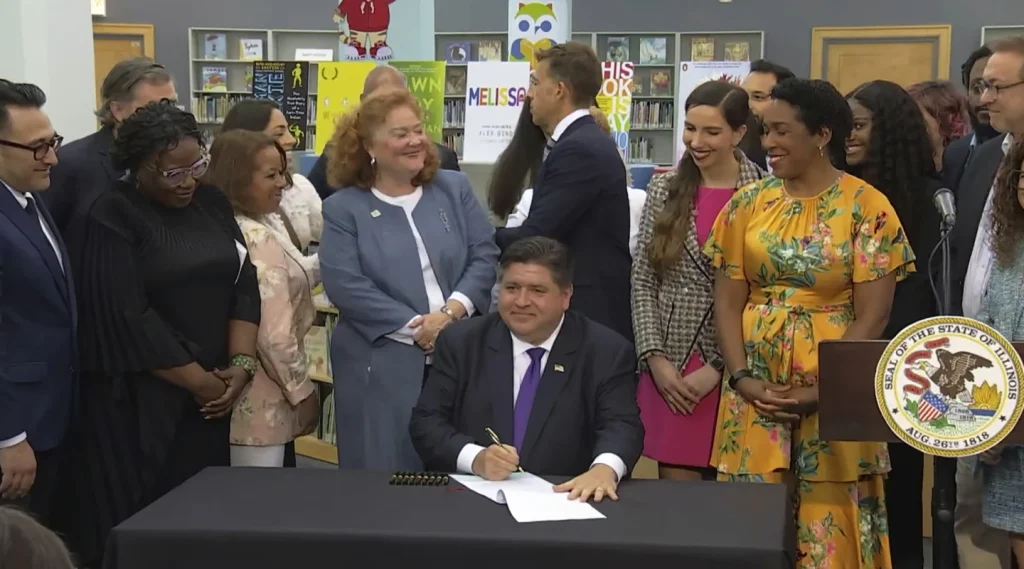In a significant change for motorists in Illinois, the state has announced that police will no longer be permitted to pull over drivers solely because of items hanging from their rearview mirrors.
This change, which takes effect on Monday, will allow for a wide range of items to be displayed in vehicles without fear of being targeted by law enforcement.
The revised Illinois windshield rule is just one of many new laws coming into effect as the new year begins across the United States.
While some of these laws may seem mundane, others have far-reaching effects or touch on controversial issues, such as restrictions on weapons and medical treatments for transgender individuals.
The original intent of the Illinois windshield law was to enhance roadway safety by preventing objects from obstructing a driver’s view.
However, over time, it became apparent that this law was being used as a pretext for pulling over drivers. The new law maintains the prohibition on objects that obstruct a driver’s view, but it explicitly forbids law enforcement officers from conducting stops or searches solely because of suspected violations of this rule.
This change represents a significant shift in the way that law enforcement interacts with motorists in Illinois.
It not only removes a potential pretext for stops, but it also sends a message that drivers should not be targeted for minor infractions that do not pose a direct threat to public safety.
In addition to the specific impact on motorists, this change also reflects a broader trend in the United States toward reevaluating the role of law enforcement and the use of traffic stops.
In recent years, there has been growing scrutiny of the ways in which traffic stops can disproportionately impact certain communities and lead to unnecessary confrontations with law enforcement.
While the change to the Illinois windshield rule may seem relatively minor in the grand scheme of things, it is emblematic of a larger shift in the way that laws and law enforcement practices are being reevaluated and revised.
It serves as a reminder that even seemingly small changes can have a meaningful impact on the lives of individuals and the functioning of our society as a whole.
As we enter a new year, it is important to consider the implications of these new laws and the broader trends that they reflect.
By paying attention to these changes and engaging in discussions about their potential impact, we can work towards creating a more just and equitable society for all.
In recent times, the legislative landscape of many states in the United States has been marked by the enactment of new laws aimed at addressing various societal issues.
From tackling racial profiling and distracted driving to regulating firearms and online activities, these laws reflect the evolving priorities of state governments.
In this essay, we will delve into the implications of these new laws and analyze their potential impact on the respective states and the broader society.

The statement made by Democratic state Sen. Christopher Belt regarding the new law in Illinois sends a resounding message about the state’s stance against racial profiling and discrimination.
This law not only reflects the commitment to upholding the principles of equality and fairness but also signifies a proactive approach to addressing systemic issues that have long plagued communities.
By explicitly prohibiting racial profiling and other forms of discrimination, the state is taking a significant step towards fostering inclusivity and ensuring the protection of civil liberties for all its residents.
Furthermore, the introduction of laws targeting distracted driving, particularly the prohibition of participating in video conferences or scanning social media while behind the wheel, underscores the growing concern over the impact of technology on road safety.
As advancements in digital communication continue to reshape our daily lives, the risks associated with distracted driving have become more pronounced.
By enacting legislation to address this modern form of distraction, states are demonstrating their commitment to safeguarding public safety and reducing the incidence of preventable accidents on the roads.
The regulation of firearms has been a contentious issue in the United States, and several states have recently introduced new laws to address various aspects of gun ownership and access.
Minnesota’s law allowing authorities to seek “extreme risk protection orders” to temporarily confiscate guns from individuals deemed to pose a threat is a significant development in the realm of gun control.
This proactive measure aims to prevent potential acts of violence and protect the well-being of both individuals and communities.
Similarly, Colorado’s ban on “ghost guns,” which are firearms assembled at home or 3D-printed without serial numbers, represents a concerted effort to close loopholes that have allowed individuals to circumvent background checks.
These legislative actions reflect a nuanced approach to gun regulation, balancing the rights of gun owners with the imperative of public safety.
In the realm of online activities, states have also implemented laws to address concerns related to online harassment, age verification for accessing adult content, and the proliferation of deepfake pornography.
The enactment of these laws reflects an awareness of the challenges posed by the digital age and the need to establish safeguards to protect individuals, particularly vulnerable populations such as minors.
By requiring online dating operators to adopt policies for handling harassment reports and mandating age verification for accessing pornographic content, states are taking proactive steps to mitigate the negative impact of online activities on individuals and families.
Additionally, the provision allowing victims of deepfake pornography to pursue legal recourse underscores the recognition of the harmful implications of manipulated content and the need to hold perpetrators accountable.
Overall, the introduction of these new laws reflects the dynamic nature of governance and the responsiveness of state legislatures to emerging societal challenges.
By addressing issues such as racial profiling, distracted driving, gun regulation, and online activities, states are demonstrating a commitment to promoting equity, public safety, and individual well-being.
However, the efficacy of these laws will depend on their implementation, enforcement, and ongoing evaluation to ensure that they achieve their intended objectives while upholding fundamental rights and liberties.
In conclusion, the enactment of new laws in various states across the United States signifies a concerted effort to address pressing societal issues and adapt to the evolving landscape of modern governance.
These legislative measures reflect a commitment to upholding principles of fairness, public safety, and individual rights, while also acknowledging the complexities of contemporary challenges.
As these laws take effect and are implemented, their impact on the respective states and the broader society will be closely scrutinized, providing valuable insights into the evolving dynamics of governance and the pursuit of a more just and secure society.
In writing this essay, it is important to note that the specific details and implications of each law may vary, and further analysis and research may be necessary to fully comprehend their impact.
As such, ongoing discourse and examination of these laws will be essential to gauge their effectiveness and relevance in addressing the multifaceted issues they seek to confront.
In recent years, the socio-political landscape has witnessed a significant surge in debates surrounding LGBTQ+ rights and the enactment of new laws impacting taxation and wages across various states in the United States.

This essay aims to delve into the multifaceted dimensions of these developments, offering a comprehensive analysis of the legislative changes and their implications.
The past few years have seen a pronounced push by conservative factions to curtail access to gender-affirming treatments for transgender minors.
This has resulted in the implementation of bans in 22 states, with ongoing legal challenges in some jurisdictions.
Notably, new laws in Idaho, Louisiana, and West Virginia are set to restrict minors’ access to puberty blockers, hormone therapy, and surgical interventions.
However, the West Virginia law does include an exception, allowing treatment with parental consent and a diagnosis of severe gender dysphoria from two doctors.
Conversely, states with predominantly Democrat-led legislatures have responded with measures aimed at safeguarding transgender rights.
For instance, Hawaii has enacted a law requiring the issuance of new marriage certificates for individuals seeking to change their listed sex. Furthermore, the state is replacing gender-specific terms in its laws, reflecting a broader societal shift towards inclusivity.
In Colorado, legislation mandates that government-owned buildings must provide gender-neutral restroom facilities, reflecting a progressive stance on LGBTQ+ inclusivity in public spaces.
However, the conservative push on LGBTQ+ policies has also manifested in efforts to restrict certain books in school or public libraries, as evidenced by the implementation of laws in Indiana and Illinois with contrasting implications for book censorship.
The onset of the new year has brought forth an array of new laws pertaining to taxes and wages, perennial concerns for state governments.
Notably, over 20 states have elected to raise their minimum wages, thereby widening the gap between state and federal minimum wage requirements.
Maryland, New Jersey, Connecticut, New York, California, and Washington are among the states implementing substantial increases in their minimum wage rates, reflecting a trend towards addressing income inequality and improving labor standards.
Concurrently, residents in several states are set to benefit from reduced tax burdens, with a majority of states having either lowered, rebated, or suspended broad-based taxes.
Kansas, for instance, is poised to reduce the sales tax on groceries, providing significant savings for families.
Connecticut’s decision to reduce income tax rates and expand tax breaks for lower-income workers and retirees underscores a concerted effort to alleviate financial burdens on vulnerable populations.
Moreover, Missouri’s decision to reduce income tax rates and expand exemptions for Social Security benefits and military training pay, along with Alabama’s exemption of overtime pay from state income tax, reflects a broader trend towards enhancing financial well-being and incentivizing economic participation.

The confluence of legislative changes pertaining to LGBTQ+ issues, taxation, and wages underscores the dynamic nature of state governance and the ongoing societal discourse surrounding these critical domains.
While conservative and progressive policies continue to clash on LGBTQ+ rights, the evolving landscape of taxation and wages reflects a concerted effort to address income inequality and enhance financial well-being for individuals and families across various states.
As these legislative changes take effect, their impact on marginalized communities, economic dynamics, and societal inclusivity will undoubtedly shape the socio-political landscape in the years to come
